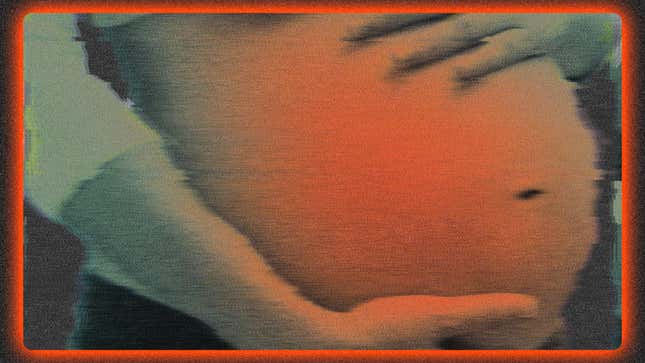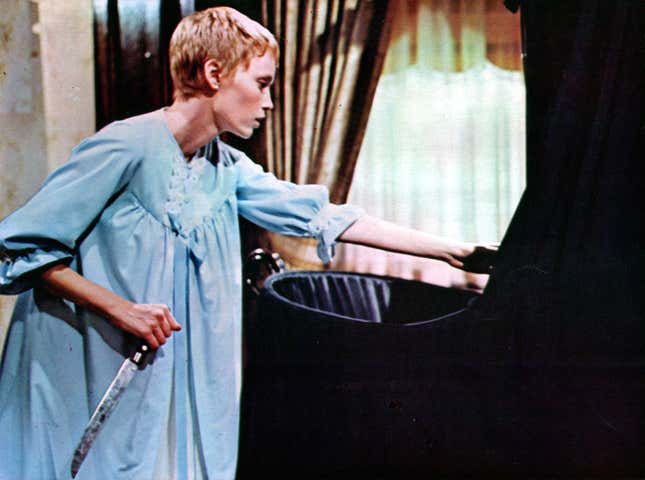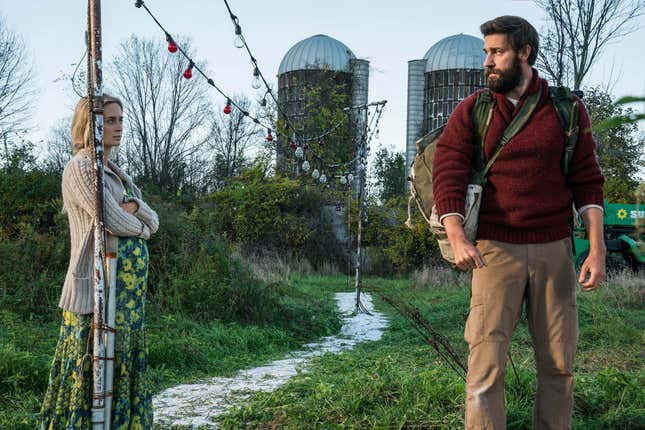Pregnancy Is Uncomfortably Perfect Fodder for Horror Movies
We don't talk enough about how scary and gross pregnancy is, one expert on the genre tells Jezebel. Horror films are finally tackling this.
In Depth
Illustration: Photo Illustration by Jezebel
Horror movies are an uncomfortably ideal medium for storytelling about the bloody, nightmarish experience that is pregnancy. I’ve seen it enough in the genre to detect a pattern. So has Jess McIntosh, a Democratic strategist, activist, and more importantly, lifelong horror enthusiast.
Pregnancy, McIntosh pointed out to Jezebel, obviously takes center-stage in movies like Rosemary’s Baby, the story of a young woman who suspects her fetus is demonic, or Ilana Glazer’s False Positive, which follows a woman after a creepy fertility doctor nonconsensually impregnates her and hundreds of other women. It is also an indelible part of a movie like A Quiet Place, in which Emily Blunt’s character visibly struggles to manage her increasingly pregnant body in a dystopian land where making a sound can be a death sentence, or mother!, where when a pregnant woman is bombarded by strangers who invade her body and home with her husband’s blessing.
“We don’t talk about pregnancy, its unglamorous parts, and we tell everybody to stay quiet about the gross parts—that only feeds the imagination even more,” McIntosh said. “Half of the horror is the very obvious, literal reality that this is a gross, scary thing that human beings do—of course it’s turned into horror movies. But then there’s the second piece, where things get really interesting, which is the loss of bodily autonomy that it brings about.”
“we see a bit of men making horror movies where they know they can’t compete with us, so they keep essentially making and re-making ‘The Human Centipede.’ But pregnancy is right there, guys.”
The months since Roe v. Wade fell in June have churned out horror story after horror story about cancer patients denied abortions they need to live, a woman forced to carry a headless fetus, and pregnant child rape victims forced to travel across the country for care. Lawmakers have gone out of their way to make pregnancy as dangerous and dehumanizing as it could possibly be. But pregnancy (including joyful, wanted pregnancy) has always been a menace. It breeds medical and interpersonal gaslighting, when the pregnant person’s discomfort is shrugged off to detrimental results. And just as the spookiest horror movies elicit a nagging feeling of being watched, pregnancy is essentially the end of all privacy—both through literal, extensive digital surveillance, and normalized, physical invasiveness.
I talked to McIntosh about whether we’ll see a reckoning with the Roe decision in horror, the most frightful depictions of pregnancy in the genre, and what we can actually take away from this horror trope. Our conversation has been lightly edited and condensed.
JEZEBEL: What first drew you to the horror genre?
JESS MCINTOSH: I was a really scared kid, and horror was a way of controlling the things that scared me and getting enjoyment out of them. That has a lot of parallels to being a woman in the world and figuring out how you’re going to control as much of it as you can, while knowing that so much of it is entirely out of your control. Horror really put you in the position of the protagonist, right? So, there’s something validating about watching it and going, “I wouldn’t have made any of these choices.” And I can see a sort of catharsis in scaring the crap out of yourself for a couple of hours, because life is really quite traumatic in and of itself.
What is it about pregnancy that’s uniquely applicable to horror movies?
-

-

-

-

-

-

-

-

-

-

-

-

-

-

-

-

-

-

-

-

-

-

-

-

-

-

-

-

-

-

-

-

-

-

-

-

-

-

-

-










































